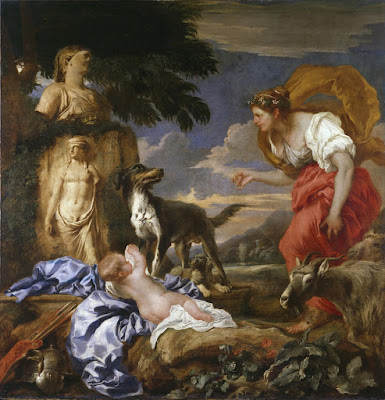 |
| Giovanni Benedetto Castiglione (il Grechetto) Finding of Cyrus by the Shepherdess Spako ca. 1650 oil on canvas National Gallery of Ireland, Dublin |
 |
| Giovanni Benedetto Castiglione (il Grechetto) Young Woman playing a Lute before 1664 drawing Morgan Library, New York |
 |
| Giovanni Benedetto Castiglione (il Grechetto) Satyr and Bacchante receiving Offerings ca. 1640 oil on copper Hermitage, Saint Petersburg |
 |
| Giovanni Benedetto Castiglione (il Grechetto) Bacchante and Satyr in a Landscape before 1664 oil on canvas Musée Antoine Lécuyer, Saint Quentin |
 |
| Giovanni Benedetto Castiglione (il Grechetto) Satyr beneath Herm before 1664 etching Metropolitan Museum of Art, New York |
 |
| Giovanni Benedetto Castiglione (il Grechetto) Adoration of the Shepherds 1659 oil on copper Musée du Louvre |
 |
| Giovanni Benedetto Castiglione (il Grechetto) Journey of Rebecca 1637 oil on canvas Museum of Fine Arts, Houston |
 |
| Giovanni Benedetto Castiglione (il Grechetto) St Jerome writing in the Wilderness before 1664 drawing Teylers Museum, Haarlem |
 |
| Giovanni Benedetto Castiglione (il Grechetto) Samson destroying the Temple of the Philistines before 1664 oil on canvas private collection |
 |
| Giovanni Benedetto Castiglione (il Grechetto) Pyrrha and Deucalion 1655 oil on canvas Gemäldegalerie, Berlin |
 |
| Giovanni Benedetto Castiglione (il Grechetto) Theseus finding his Father's Weapons 1645 etching Harvard Art Museums |
 |
| Giovanni Benedetto Castiglione (il Grechetto) Entry of the Animals into the Ark before 1664 oil on canvas Accademia Ligustica di Belle Arti, Genoa |
 |
| Giovanni Benedetto Castiglione (il Grechetto) Immaculate Conception with St Anthony of Padua and St Francis of Assisi 1649-50 oil on canvas Minneapolis Institute of Arts |
 |
| Giovanni Benedetto Castiglione (il Grechetto) The Angel departing from the Family of Tobit ca. 1655 drawing (oil on paper) Art Institute of Chicago |
 |
| Giovanni Benedetto Castiglione (il Grechetto) Tobit burying the Dead ca. 1647-51 etching Metropolitan Museum of Art, New York |
"Unlike many Italian artists, Giovanni Benedetto Castiglione was profoundly influenced by foreigners. He first studied with local artists in his native Genoa, absorbing not only Tuscan Mannerism and Caravaggism but also the style of Peter Paul Rubens, who had worked in Genoa. From 1621 Castiglione also worked in Anthony van Dyck's Genoa studio. Early on, he was attracted to Flemish animal painting. Though he painted portraits, historical pieces, and landscapes, Castiglione excelled in rural scenes with animals, and influenced Italy's animal painting specialists. In 1634 Castiglione was in Rome, where he remained for about ten years. After returning to Genoa for a time, he worked for the Mantuan court in 1648, which had also employed Rubens. There Castiglione picked up the freedom of touch he saw in Domenico Fetti. One of the first Italians to appreciate Rembrandt van Rijn's etchings, Castiglione probably invented the monotype. Also admired for his fluent brush drawing in oil on paper, Castiglione influenced artists throughout Europe and virtually every Italian printmaker who followed."
– from curator's notes at the Getty Museum, Los Angeles